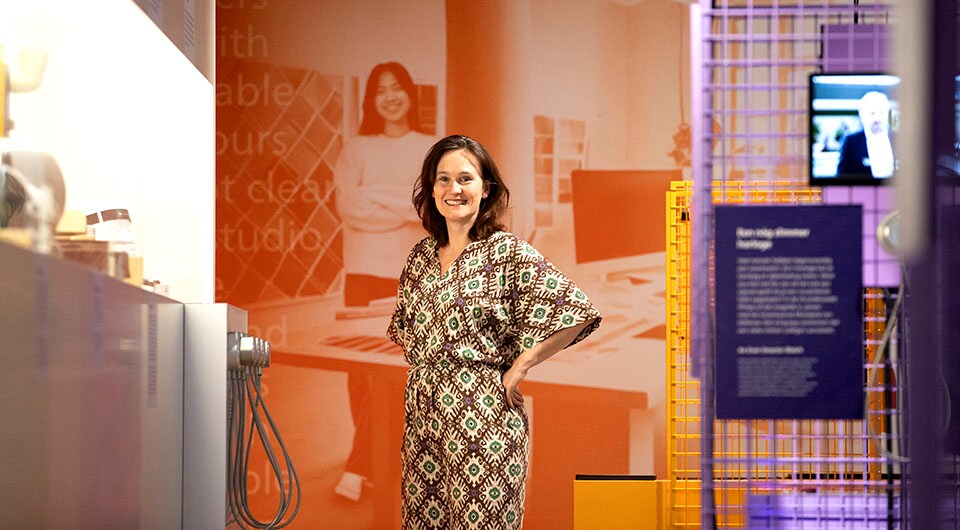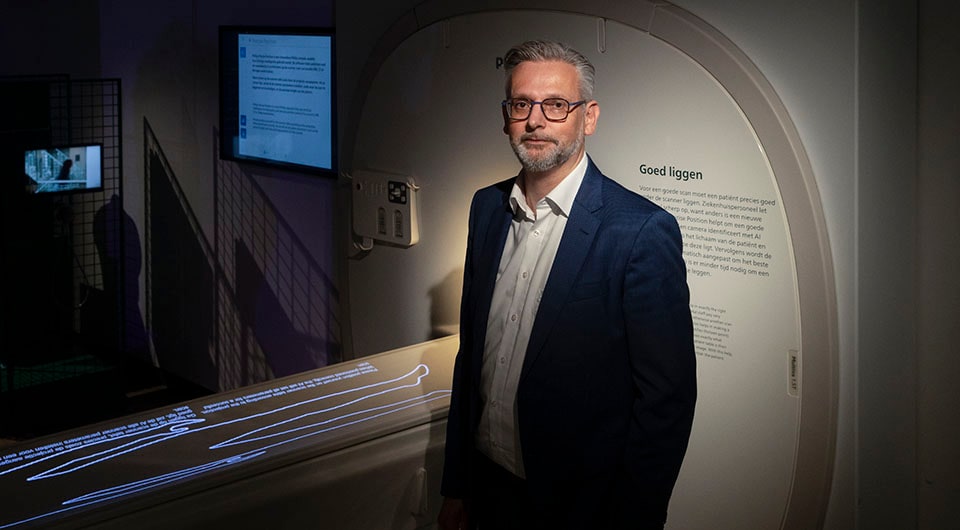Who is afraid of AI in the future? Many. The Philips Museum is trying to ease fear with an exhibit on artificial intelligence, commonly abbreviated to AI (Artificial Intelligence), and applied by Philips. The technology company that specializes in health thinks that AI could be important to literally make the world a better place. And the future is closer than you think, says Joland Rutgers, vice president and head of Innovation Excellence at Philips.
The brAInpower exhibition at the Philips Museum offers a glimpse into the world of AI. For thousands of Philips employees, and hundreds of thousands more engineers who have been working in the high-tech industry worldwide for decades, AI is a daily occurrence. The rest of humanity was only introduced to 'generative' AI in 2022 through now-popular apps such as ChatGPT or Google's Gemini, which allow users to compose music, write lyrics and create videos in any language they want. Extremely handy, according to many people.
Philips itself finds the exhibition special because it is the first to link past, present and future and is also interactive. Visitors are asked about the significance of AI in their lives. Museum director Olga Coolen states that Philips has been active in the field of AI for seventy years, at least if you consider the computer as such.
Philips Acutely Fast Calculator
BrAInpower has an educational character and wants to familiarize people with the phenomenon of AI. To this end, collaboration has been sought with Brainport partners such as Eindhoven University of Technology, ASML and NXP. The content is linked to current events and social issues that concern society.
"In the early 1960s, Philips already had an 'Acutely Fast Calculator', called Pascal. AI is software that is very good at pattern recognition," she explains. "To do that, you need a very fast computer with a lot of computing power and enormous data storage. The outcome depends on the prompt (command - HM) you enter, and a combination of everything that can be found on the internet about a subject. The first computers were the size of a building, now they are the size of your smartphone."
Socially relevant function
According to Olga Coolen, museums are slowly but surely taking on a more socially relevant function than just providing insight into the history of a subject. As an inspiring example in the Netherlands, she mentions the Boerhaave science museum in Leiden.
"I really enjoy looking at the challenge of linking it to current events. We will continue to lower the threshold for thematic programming with a focus on relevance in the present. That's our mission as a museum."

Significant difference
There are many topics that are all related to AI and that Philips has been working on. It is not illogical that the emphasis is placed on healthcare, because the company has developed from a multinational that was mainly focused on consumer electronics to a global 'health technology company that wants to improve people's health through meaningful innovations'. To this end, Philips collaborates with hospitals, scientists and doctors.
One of them is Shez Partovi, Chief Innovation and Strategy Officer at Philips. In the past, he worked as a radiologist, among other things. He opened the exhibition brainpower in the Philips Museum and told the guests that in the coming years, AI will help doctors gain more insight into people's health. Above all, AI can certainly help in making the correct diagnosis and detecting hidden ailments and ruling them out.
"AI can make a significant difference on a scale we've never seen before," he stated. In this sense, the future as shown in the science fiction series Star Trek has all but arrived. "We're moving steadily in that direction with the advancement of technology. Philips embraces the power of AI in a responsible, equitable and ethical way," the executive said.
Second pair of eyes
The 'Philips Health Care' is not only based on the needs of the consumer or patient, but also on those of doctors and hospital staff, says Joland Rutgers. "There is a lot of pressure on health systems and networks," he says. "There are staff shortages, many people are overworked. In addition, people are getting older, which is positive, but it does create even more work and therefore greater pressure on healthcare. We are looking for solutions for this. AI is a technology that can help us tremendously with that."
As an example, he mentions the latest scanners from Philips, which are three times faster with the same or even better image quality. The comfort for the patient is greater, doctors gain better insight and the hospital can help more people in a day, Joland explains. "All technological developments around AI, including deep learning, are being applied, for example to improve the result of a scan. Doctors can make a diagnosis faster, which is also good for the patient because they don't have to wait as long. We want to make it easier for everyone."
It is not the case that software-controlled machines in healthcare are going to take over the task of doctors, he reassures. "No, you have to think of AI as the second pair of eyes watching. That's important because now we're very dependent on people, who look at the data, but are often very focused on one thing to see. Our brain is very selective and focused on one task. Then we can be so concentrated that we don't see other things, such as a tumor in another place.
Based on the algorithms that have been entered, which in turn are based on all available data, even years ago, AI can recognize diseases earlier, sharper, faster and more accurately. So in situations where a lot of data plays a major role, AI can help doctors make an even better diagnosis. Doctors continue to make the decisions; they can only draw better conclusions based on the insights provided by AI."

Light in the darkness
Because hospitals store patient data for quite a long time, they have an enormous wealth of information at their disposal to recognize and detect diseases with the help of AI, according to Joland. This is done on the condition that legally established protocols that protect the privacy of patients, is also Philips' starting point.
"Patients are going to play an important role in the future. The exchange of information between AI and patients becomes interactive. That can also help prevent disease. You can think of AI as something technical, but also as something natural. We all have a smartphone and we think that's quite normal. You don't want to know how much AI is in there."
Developments are moving so fast; it is important for Philips to monitor them closely and to contribute where necessary, for example in the field of AI standardisation, Joland observes. "I like to compare Philips' past, of which we are proud, with giving light in the darkness. So did the light bulb. AI, like the light bulb, brings light into the dark. AI provides insight into information from patients and hospitals. That's the darkness. AI is a tool we use to find impactful solutions for the benefit of our customers, patients, and consumers. As Philips, we are and will remain true to our legacy. If you apply the technology properly, you can work wonders."
Text written by Hans Matheeuwsen, copyright images: René Manders.
Would you like to visit the brAInpower exhibition yourself?
Learn more about AI in healthcare.

